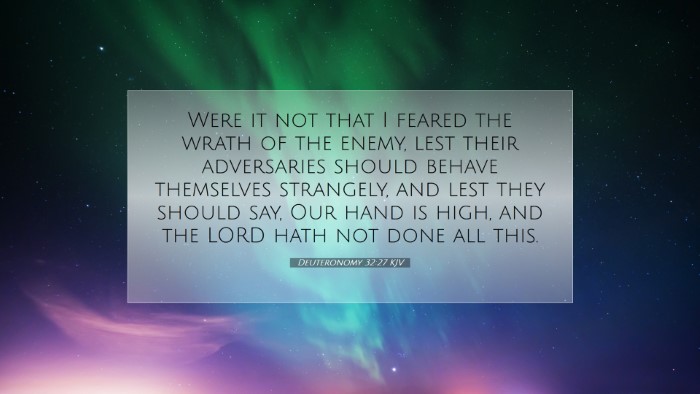Commentary on Deuteronomy 32:27
Verse (Deuteronomy 32:27): "Were it not that I feared the wrath of the enemy, lest their adversaries should behave themselves strangely, and lest they should say, Our hand is high, and the Lord hath not done all this."
Introduction
This verse is part of the Song of Moses, which serves as a profound declaration of God’s dealings with Israel, their rebellion, and God's faithful yet severe justice. It encapsulates themes of divine retribution, the frailty of human strength, and the sovereignty of God, highlighting the reason God allows certain judgments rather than executing them fully.
Commentary Summary
Matthew Henry's Commentary
Matthew Henry notes that this verse reveals an important aspect of God’s providence and restraint in judgment. The fear of the wrath of the enemy signifies God’s concern that His people’s adversaries might misinterpret His moderation and non-punishment of Israel as weakness rather than mercy and justice. Henry emphasizes that God's deliberation in judgment reflects His character, where he balances justice and mercy, fearful that the enemies of Israel might take glory for themselves, attributing the fall of Israel to their own might rather than acknowledging the Lord's sovereignty.
Albert Barnes' Notes
Albert Barnes elaborates on the implications of God’s judgment. He points out that God is mindful of the implications of His actions. Should He unleash His wrath against Israel without restraint, the surrounding nations would proclaim that they had achieved victories over Israel by their own strength, dismissing God’s role entirely. Barnes articulates that God’s restraint serves to keep the glory of His name intact and to maintain the recognition of His sovereignty among both Israel and their enemies. He underscores the idea that God’s moderation in judgment highlights His omnipotence and strategic wisdom.
Adam Clarke's Commentary
Adam Clarke provides insights into the psychological and social dynamics present in the verse. He suggests that there is an acknowledgment of the deep-rooted human tendencies to boast and the ramifications of such boasting. Clarke posits that, were God's hand to fully punish Israel, the nations would boast about their power, failing to recognize the hand of God in the matter. Thus, Clarke connects this notion to the overarching theme of humility before God and the understanding that true strength resides in dependence on His grace rather than human accomplishment.
Theological Implications
When examining Deuteronomy 32:27 in its context, we see a vivid illustration of the tension between divine sovereignty and human responsibility. The hesitance expressed by God to act against Israel illustrates a God who is not only just but also deeply relational, concerned with how His actions affect various parties, including the nations that surround His people.
- The Sovereignty of God: God's sovereignty is underscored in His decision-making process. He is not arbitrary but considers the implications of His actions.
- Divine Restraint: The fear of His enemies underscores the theology of divine restraint. God’s choices are deliberate and infused with wisdom aimed at demonstrating His ultimate authority.
- Human Boasting: There is a profound warning against human pride and boasting as the narrative connects the actions of Israel with the perceived strength of their adversaries.
- God's Concern for His Name: God’s reputation among the nations is at stake—a reminder that His desire for glory is linked to the faithfulness and identity of His people.
Practical Applications
This verse encourages believers to consider the broader narrative in which they exist—the need for humility, the recognition of God's sovereignty, and the understanding that their actions have implications on how God is perceived by the world. Here are a few reflective applications:
- Humility in Leadership: As leaders, reflecting on God’s restraint invites humility—fostering a disposition that seeks God’s wisdom over personal ambition.
- Awareness of Influence: Individuals and communities ought to recognize their role in portraying the character of God, acting in ways that uplift His name rather than diminish it through pride or rebellion.
- Prayer for Guidance: When facing challenges, believers are encouraged to seek God's guidance, remembering His plans for nations, communities, and personal lives align with His broader agenda of redemption and relationship.
- Witness to Others: The careful consideration of our responses can turn hearts to God, revealing His mercy and inviting others into a relationship with Him based on His glory rather than human achievements.
Conclusion
Deuteronomy 32:27 serves as a rich verse offering insight into God’s character, the dynamics of judgment, and the implications it bears on human behavior. As we engage with this text, it prompts us to ponder the complexities of divine justice and mercy, how we represent God to the world, and the importance of remaining cognizant of our reliance on His grace. These themes resonate deeply within theological studies, pastoral applications, and personal devotions alike, remaining pertinent for contemporary faith communities striving to influence the world positively.


